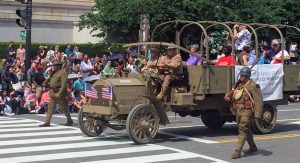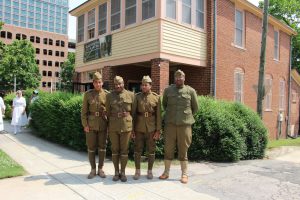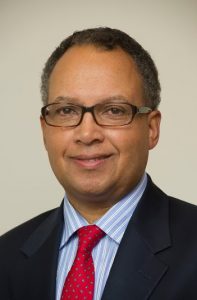Ebony Doughboy Charles Whitaker of Forestville, Md, was interviewed by the Washington Post In reference to our participation in Washington DC’s 2017 Memorial Day Parade. Charles represented African American Veterans from the 93rd Division in WWI.
Ebony Doughboys had the honor of marching in the Washington DC 2017 Memorial Day Parade along with WWI re-enactors from all over the US as well as members of the US WWI Commission .
Ebony Doughboys Charles Whitaker and Kelly Washington represented African American WWI Veterans who served in France during the Great War.
April 29, 2017 Black WW1 Doctors Visit Raleigh’s Pope House Museum The Ebony Doughboys Participate in the “Black Pioneers in Uniform” Program : For years, the legacy of African American World War One servicemen has largely been unsung, least of all the stories of those doctors who volunteered to be medical officers. However, this is slowly changing. Black Pioneers in Uniform: Shaw University’s Leonard Medical School & the Great War is a new living-history event hosted by the Pope House Museum to commemorate those Leonard graduates who became medical officers, including the community that nurtured them, and the life of Dr. Manassas Thomas Pope. Many of them were taught by Dr. Pope, who was himself a veteran of the Spanish-American War, Raleigh’s first licensed African American physician and a bold civic leader who ran for mayor in 1919. Today his home, acquired by the City of Raleigh in 2011, stands anachronistically in the central business district, an artifact of the then-black residential Fourth Ward and testimony to his influence.
: For years, the legacy of African American World War One servicemen has largely been unsung, least of all the stories of those doctors who volunteered to be medical officers. However, this is slowly changing. Black Pioneers in Uniform: Shaw University’s Leonard Medical School & the Great War is a new living-history event hosted by the Pope House Museum to commemorate those Leonard graduates who became medical officers, including the community that nurtured them, and the life of Dr. Manassas Thomas Pope. Many of them were taught by Dr. Pope, who was himself a veteran of the Spanish-American War, Raleigh’s first licensed African American physician and a bold civic leader who ran for mayor in 1919. Today his home, acquired by the City of Raleigh in 2011, stands anachronistically in the central business district, an artifact of the then-black residential Fourth Ward and testimony to his influence.
By the turn of the 20th century, only three Historically Black Colleges and Universities had medical programs: Meharry in Nashville; Howard in Washington, DC; and Leonard at Shaw University in Raleigh. Leonard Medical was the first, opening in 1880, yet due to rising costs closed in 1919. However during this period, it produced 400 physicians which included 13 of the 104 African American volunteer doctors of the First World War.
“This program is designed to connect a community with its own World War One legacy; we are honored to participate,” said Art Collins, founder and president of the Ebony Doughboys, the only organization of living-historians educating the public on the impact of those African Americans serving in the Great War. Ebony Doughboys was pleased to have W. Douglas Fisher author of “African American Doctors of WWI to talk about these groundbreaking heroes. “We are excited to have the unit support our event,” said Ernest Dollar, manager of the Pope House Museum. “They bring knowledge, and dedication, to a story that is largely unknown.”
On 2/25 2/26 We celebrated our 6th consecutive year of our living history timeline 3 Centuries of African American Soldiers. 3 Centuries as the event is now affectionately known is a timeline that starts from the Revolutionary War to Korea. Reenactors dressed in period uniforms tell the history of their particular time period and show off their valuable militaria collections. 3 Centuries was established to honor African American Veterans who have served in all of America’s wars till present.
Our special guest this year was NYU Professor and Author Dr. Jeffery Sam mons who lectured on his book about the 369th Infantry Regiment “Harlem Hellfighters” “The Harlem Rattlers and The Great War”.
mons who lectured on his book about the 369th Infantry Regiment “Harlem Hellfighters” “The Harlem Rattlers and The Great War”.
Ebony Doughboys is a 501(c)3 non-profit organization that relies on your generosity to advance our goal in educating the public about the contributions of African American combat soldiers in the 93rd Infantry Division during WWI. Through your generosity we can continue to educate the public about these men through our traveling history exhibits, educational programming, living history presentations and battle reenactments.
Please help us in honoring the memory of these forgotten soldiers who fought two wars, one in France and the other on the home front.